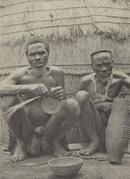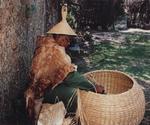
In areas such as present-day KwaZulu-Natal, basket coiling traditions were originally associated with men. In other communities, some winnowing baskets were also made by men.
Interestingly, though, these were generally plaited rather than coiled. In the Nata River region of Botswana and elsewhere in southern Africa, older women have historically been responsible for making most other types of baskets, doing lighter, more prestigious work than their younger counterparts.
Women often attach considerable value to their baskets, taking care to protect them from rough use. In the Nata River region, for example, some used leather or a heavy cloth to repair or reinforce the base or rim of a worn basket.

The growing availability of plastic containers has not necessarily discouraged the use of locally manufactured baskets and other vessels.
In some communities, baskets therefore continue to play an important role in the daily routine of village compounds, where they are used in nearly all aspects of the production and storage of food. But it is now more often in tourist villages such as the Basotho Cultural Village in the eastern Free State that men still practice the art of coiling large grain storage baskets.

In most rural communities, the domains of male and female labour and control tend to remain separate, often complimenting one another. Among pre-colonial Zulu-speaking communities, basket-making was a man’s job.
This included the production of lidded, globular-shaped food baskets (ingcungu) for storing boiled maize grains, larger food and storage vessels, and izimbenge, used to cover the lids of beer pots, for serving certain dry foods and to store other small household items.
But it was women who embellished these izimbenge, often making attractive beaded canopies that they sewed onto the coiled beer pot lids produced by men. Used especially on ritual occasions to protect home-brewed beers from flies, these lids vary considerably in style, attesting to the inventive artistry of individual female beaders.
By Professor Sandra Klopper